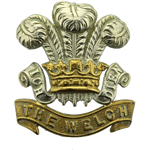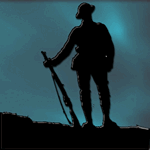Commemorated: | |||
| 1. Grave: | Heilly Station Cemetery Mericourt-L'Abbe | IV.F.7 | |
| 2. Book: | The (1921) Masonic Roll of Honour 1914-1918 | Pg.127 | |
| 3. Memorial: | The (1940) Scroll - WW1 Roll of Honour | 16A GQS | |
Awards & Titles: | |||
Family :
Son of James Nelson Knapp and Emily Frances Knapp, of 66, Richmond Rd., Roath, Cardiff.Service Life:
Campaigns:
- The First World War 1914-1918, World-wide.
| Unit / Ship / Est.: 2/Welsh Regiment |
| Action : The Battles of the Somme 1916 |
The Battle of the Somme 1st July - 18th November 1916 is inevitably characterised by the appalling casualties (60,000) on the first day, July 1st 1916. Having failed to break through the German lines in force, and also failed to maximise opportunities where success was achieved, the battle became a series of attritional assaults on well defended defence in depth. The battle continued officially until 18th November 1916 costing almost 500,000 British casualties. German casualties were about the same, and French about 200,000. The Somme could not be counted a success in terms of ground gained or the cost, but it had a strategic impact as it marked the start of the decline of the German Army. Never again would it be as effective whilst the British Army, learning from its experience eventually grew stronger to become a war winning army. The German High Command recognised that it could never again fight another Somme, a view that advanced the decision to invoke unrestricted submarine warfare in an attempt to starve Britain of food and material, and in doing so accelerated the United States declaration of war thus guaranteeing the eventual outcome. 287 Brethren were killed on the Somme in 1916.
My dears …
The rain drips down on Rouen Town
The leaves drip down
And so the mud
Turns orange brown ….
A Zeppelin, we read, has been brought down.
And the obscure brown
Populace of London town
Make a shout of it,
Clamouring for blood
And reductions in the price of food …
But you – at least – are out of it ….
Poor little Arnott—poor little lad …
And poor old Knapp,
Of whom once I borrowed a map—and never returned it.
And Morris and Jones … and all the rest of the Welch,
So many gone in the twenty-four hours of a day …
One wonders how one can stay…
One wonders ….
For the papers are full of Kelch,
Finding rubbishy news to make a shout of it,
But you at least are out of it.
One wonders how you died …
The mine thunders
Still where you stuck by Welch Alley and turned it ….
The mine thunders
Upwards—and branches of trees, mud, and stone,
Skulls, limbs, rats, thistles, the clips
Of cartridges, beef tines and wire
Belch
To the heavens in fire
From the lips
Of the craters where doubtless you died,
With the Cheshires and Wiltshires and Welch
Side by side.
One wonders why you died,
Why were we in it? …
At home we were late on parades,
Seldom there to the minute,
When “B.” were out on Cathays
We didn't get much of the lectures into the brain ….
We talked a good deal about girls.
We could all tell a story
At something past something, Ack Emma!
But why? Why? Why were we there from the Aisne to Mametz,
Well—there's a dilemma ….
For we never talked of glory,
We each thought a lot of one girl,
And waited most days for hours in the rain
Till she came:
But we never talked of Fame ….
It is very difficult to believe
You need never again
Put in for week-end leave,
Or get vouchers for the 1.10 train
From Cardiff to London ….
But so much has the Hun done
In the way of achievements.
And when I think of all the bereavements
Of your mothers and fathers and sweethearts and wives and homes in the West,
And the paths between the willows waiting for your tread,
And the white pillows
Waiting each for a head,
Well … they may go to rest!
And, God help me, if you meet a Hun
In Heaven, I bet you will say, “Well done,
You fought like mad lions in nets
Down by Mametz.”
But we who remain shall grow old,
We shall know the cold
Of cheerless
Winter and the rain of Autumn and the sting
Of poverty, of love despised and of disgraces,
And mirrors showing stained and ageing faces,
And the long ranges of comfortless years
And the long gamut of human fears ….
But, for you, it shall be forever spring,
And only you shall be forever fearless,
And only you have white, straight, tireless limbs,
And only you, where the water-lily swims
Shall walk along the pathways, thro’ the willows
Of your west.
You who went West,
And only you on silvery twilight pillows
Shall take your rest
In the soft sweet glooms
Of twilight rooms ….
No. 2 Red Cross Hospital,
Rouen, 7/1/17
—Ford Madox Ford
Detail :
KNAPP, 2nd Lt. Oswald Reed. 2nd Bn. Welch Regt. Died 13th Sept., 1916, of wounds received 9th Sept. Age 30.
According to the Regimental War diary, Oswald was wounded at High Wood on September 8th: “a vigorous bomb fight proceeded with varying success until about 3 a.m., when, before a violent counter-attack our bombers, now very fatigued, were forced to retire. They fought tenaciously but only managed to retain a part of the communication trench which they had dug out to the trench they had taken.”** He died five days later on September 13, 1916. He is buried at Heilly Station Cemetery; his grave inscription reads, “Greater Love Hath No Man Than This That A Man Lay Down His Life For His Friends.”
Masonic :
| Type | Lodge Name and No. | Province/District : |
|---|---|---|
| Mother : | Bute No. 960 E.C. | South Wales |
Initiated | Passed | Raised |
7th March 1911 | 6th March 1912 | 4th June 1912 |
Employed as a Marine Engineer from Cardiff when initiated into Bute Lodge No. 960 at Cardiff in 1911. He is seen in arrears, probably on war service for two years before "Died Sept/16."
Source :
The project globally acknowledges the following as sources of information for research across the whole database:
- The Commonwealth War Graves Commission
- The (UK) National Archives
- Ancestry.co.uk - Genealogy, Family Trees & Family History online
- ugle.org.uk - The records of the United Grand Lodge of England including the Library and Museum of Freemasonry
Additional Source:
- Founder Researchers : Paul Masters & Mike McCarthy
- Researcher : Bruce Littley

